One of the popular atheist bloggers who was grievously wounded in an assassination attempt by the Islamic fundamentalists, Sunnyur Rahman, now lives in Delhi, India. He is a rationalist atheist activist from Bangladesh and an author of many popular Bengali books apart from being a talented cartoonist, graphic artist, and lyricist. He fearlessly raises critical questions and exposes the exploitation through religious propaganda. His skepticism has invited violent fundamentalism upon himself but that has not discouraged him as revealed in the scintillating discussion with Poulami and Kausik Gangopadhyay. Some excerpts are presented below.
You were born in a Muslim family. Did you grow up in a Muslim society? How did you develop early doubts about religion and God?
I spent the first 21 years of my life in Riyadh, Saudi Arabia. In my childhood, my recital of Quranic Surahs earned me praises from the teachers at the Madrassa where I was taught. When I grew up a bit and still in school, I was confused to reconcile the Quran with the world of reason. It was said that Allah causes rain through his angel Mikail depending on human needs. If so, I questioned, why don’t we ever see any rainfall in the Sahara desert? The scientific theory of the water cycle looks much more promising rather than the Quranic theory, isn’t it?
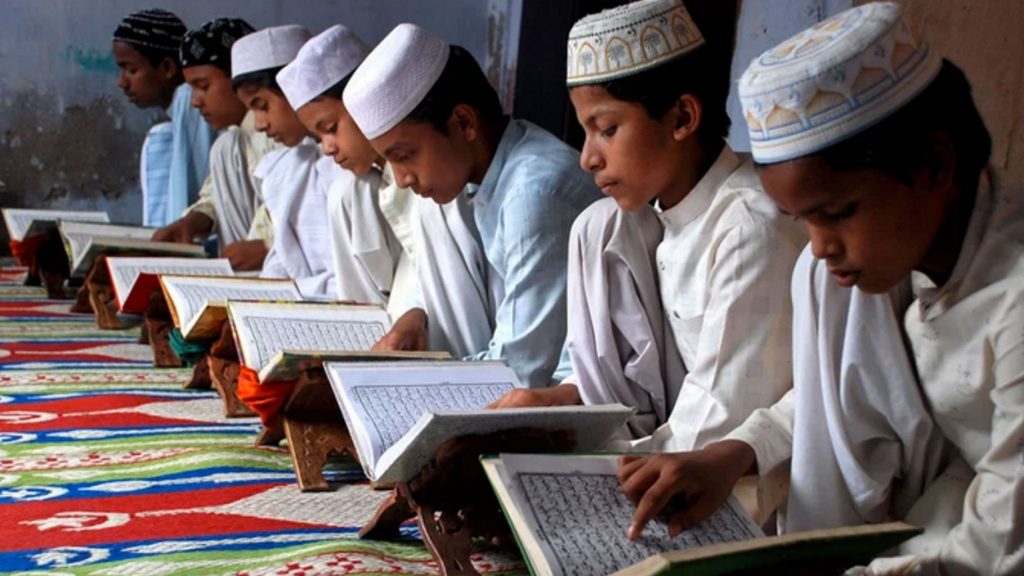
What was the reaction of your teachers?
The Maulanas could not answer these questions of mine but got furious and condemned me as Kaffir. I wasn’t discouraged by it. It pushed me towards studying more deeply on these topics.
How did your parents and the society at large react to your scepticism?
I asked my mother flatly if she considered the Quranic description of her being a place of husband’s sowing of seed (the Quran 2:223) disrespectful. She was unhappy with me for questioning Allah.
Should God not reward good deeds like work of Mother Teresa for the downtrodden, instead of observing who is praying to Him and who is not? Why should He be bothered about such petty-minded notions? I did not restrict myself from these discussions at my workplace at Medina and was fast becoming persona non grata. I was not a complete disbeliever back then but merely a sceptic. When words were out in the air that I would be fired from my job, I even used to pray to Allah, “O Allah! Let me not get fired from my job. I am only asking for my just right of earning by my hard work.” How innocent was I back then!
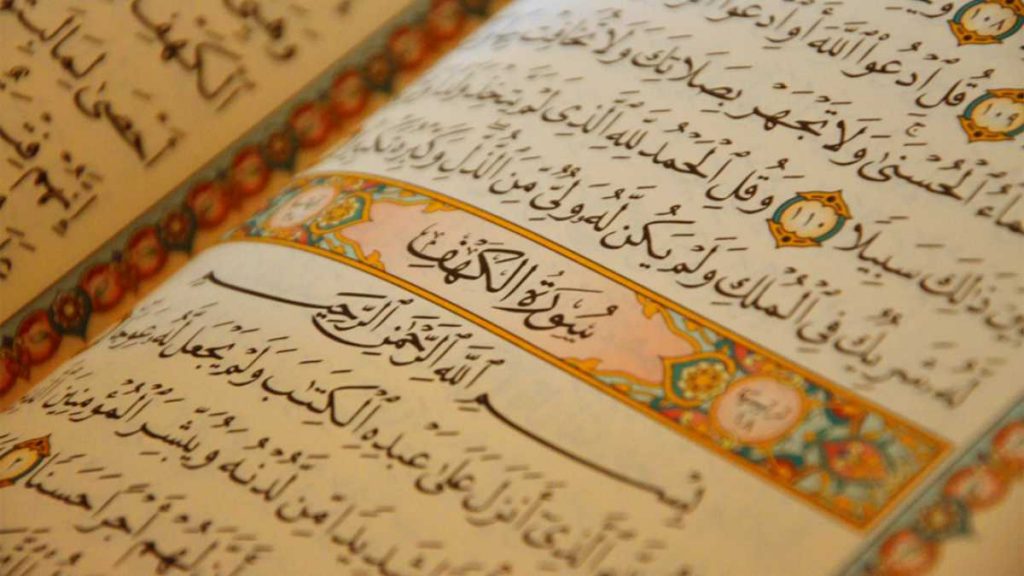
Were you then fired? What happened to your skepticism after then?
I was fired within a few days. The rumours were correct. After being fired, the skeptic in me became firmly an unbeliever!
You are one of the famous atheist bloggers of Bangladesh ,consistently and systematically being targeted by the Muslim Fundamentalists. How did it start? What made you an activist of Atheism?
From Riyadh, I came back to Dhaka, Bangladesh and got married to my cousin. I was in my early twenties that time. By then, I completed my Bachelor’s degree in computer science. I also have my proficiency in graphics designing and making cartoons. On account of my skills, I found a coveted employment in Central Depository of Bangladesh Limited. I fathered a son a year after my marriage. I became a full-fledged family man. The life was, then, rather smooth for me.
I started posting couplets on different themes in social media and was becoming popular. One of my couplets was that Creator and a creative mind, both, love listening to own praises. Controversy erupted when Muslims challenged me on the Creator part of this couplet. I pointed out to the text of the namaz, that is the first Surah of Al-Fatiah from the Quran and it is no different than an explicit flattery of Allah. I also highlighted that it was made mandatory by Allah Himself for Muslims to recite this namaz five times daily.
My writing eventually appeared as a book entitled Nāstika which made me famous; though now I see that book rather amateurish. I also made an exhibition on graphical art on the theme Cogito ergo sum (I think; therefore I exist). In the newspaper called the Daily Star, the exhibition received critical acclamation. This was also not liked by the Muslim fundamentalists.
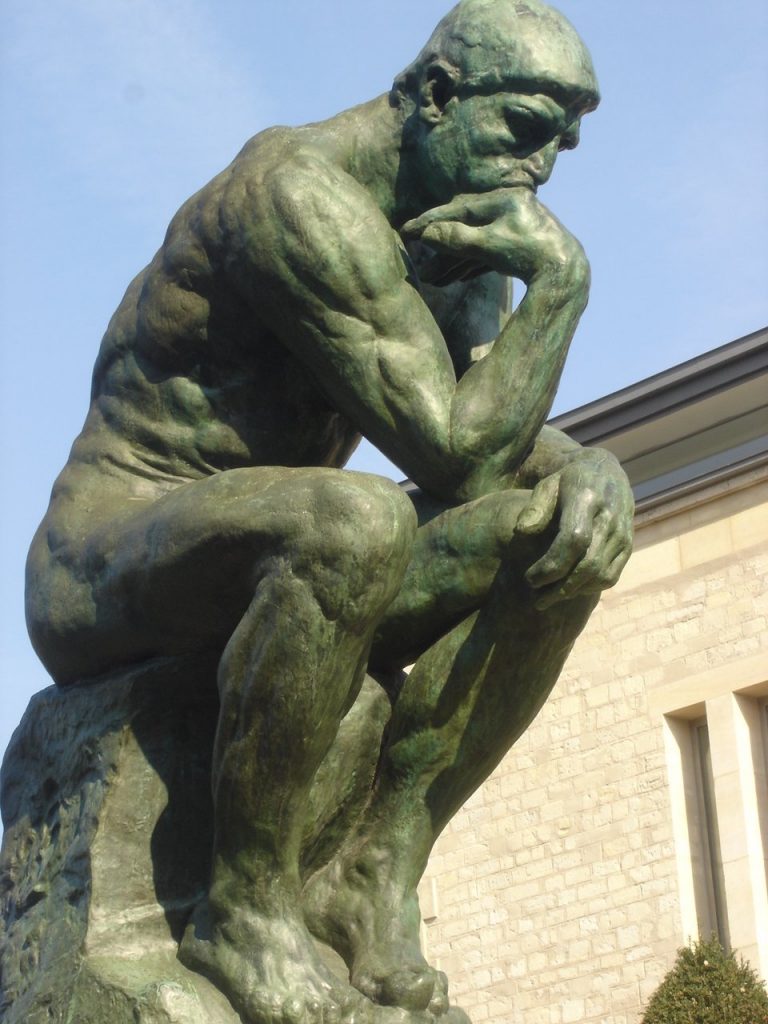
It was no less than a dare to publish this book Nāstika and also some other books under my real name and with my photo in Bangladesh. I was welcomed into the budding rationalist atheist movement of Bangladesh and got connected to intellectual luminaries like Asif Mohiuddin, Ahmed Rajib Haider, Avijit Roy and Prabir Ghosh. I was an organizer for the organization Science and Rationalist Association of Bangladesh, in short Sraban. We used to make fun of astrologers and miracle healers. I developed deep friendship with persons like Niloy Neel and Tasib Hassan. Tassib is absconding right now from the Muslim fundamentalists. Niloy already left all of us….
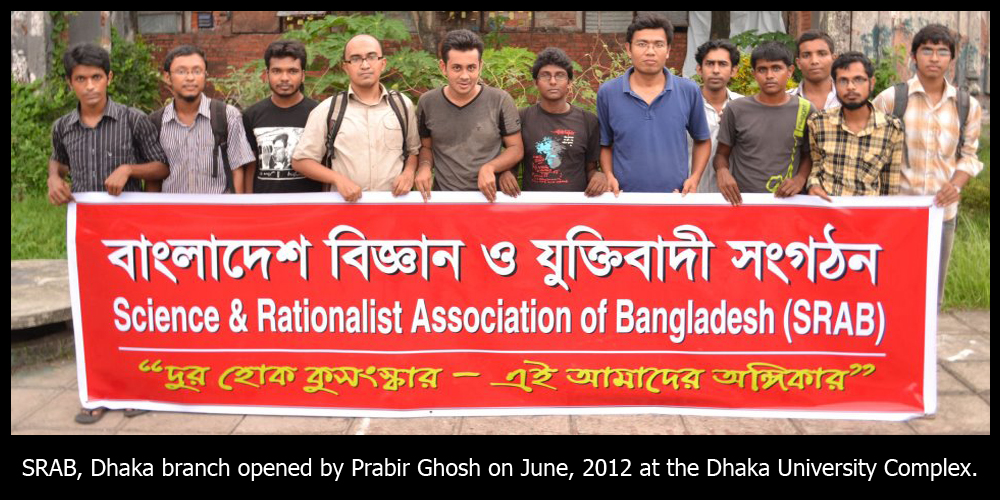
What was the agenda for your activism? What was the main message you were highlighting to the people of Bangladesh?
The people of Bangladesh took a stand to assert their Bengali identity in 1971 during their War of Liberation against Pakistan and opposed the imperial imposition of Urdu. The Pakistani authorities were openly communal. Yahya khan, the then president of Pakistan, instructed his soldiers to rape the Bengali Hindu women to impregnate them all with Muslim children only. The inglorious organisation Jamaat–e–Islami Bangladesh and its leaders like Ghulam Azam and Salahuddin Quader Chowdhury were in cahoot with the Pakistani oppressors.
Yet, after the assassination of Sheikh Mujibar Rahman in 1975, the historical course took an unwarranted new turn. Ziaur Rahman as premier, offered succor to Jamaat–e–Islami Bangladesh, once again. The history was distorted in suppressing the role of Islamist Rājākārs and their anti-national acts during the Liberation War. Education was gradually taken over by the Muslim fundamentalists with increasing Arabisation of Bengali language and expulsion of Hindu authors from the school textbook. The sapling Ziaur planted, has grown into the poison tree over the last four decades. Now, Bangladeshis largely sympathise with Pakistan, their once oppressor, and mostly hate India, their liberator. It became a Muslim country falling from its secular ideals. I was becoming aware about the true history of my nation this time and also became aware of pervasive distortions regarding historical facts.
We were also participating in philanthropic activities and protesting the targeted heart-rending atrocities against the minorities (the Hindus) of Bangladesh. As a typical case, take a Hindu family consisting of a widowed mother and an adolescent daughter of 13 years old. Seven hooligans came at night—two were raping the mother and the other five together gang-raping the daughter. The mother, while being raped, was begging to those rapists to not rape her daughter all together but one by one as she is too young for such an assault. We highlighted these beastly atrocities which generally receive support from the Muslim fundamentalists.
How did such so-called religious people justify their barbarism?
The agenda of the Muslim fundamentalists is to define any opponent as Kaafir and then remove all such kaffirs from Bangladesh. Encouraging hooligans to persecute the Hindus is a strategy for them to create a kaffir-less Bangladesh. And, their strategy is winning as well. The falling population share of Hindus and Buddhists of Bangladesh over time, from close to 30% of the population to less than 10% today, is a fact.
You were associated with the now-legendary Shahbag movement. Was it this time when this movement was born? How was the movement born?
On the fifth day of February, 2013, we, more precisely only 26 of us, started a non-violent movement to highlight the issues with Rājākārs. I wrote and published a book that time exposing the Rājākārs, entitled Rājākārer Keertikalāp (“Glorious” Deeds of the Rajakars). We were using our artistic talents to attract public attention. In the first day, we were ridiculed and laughed at. But soon, we received considerable public attention. The Ekushey Book Fair on the occasion of Bangladesh’s Independence Day was taking place and when people were coming to that book fair, we highlighted to them about the persecution we Bengalis faced by the Rājākārs who not only evaded the law but also rose to prominent posts.
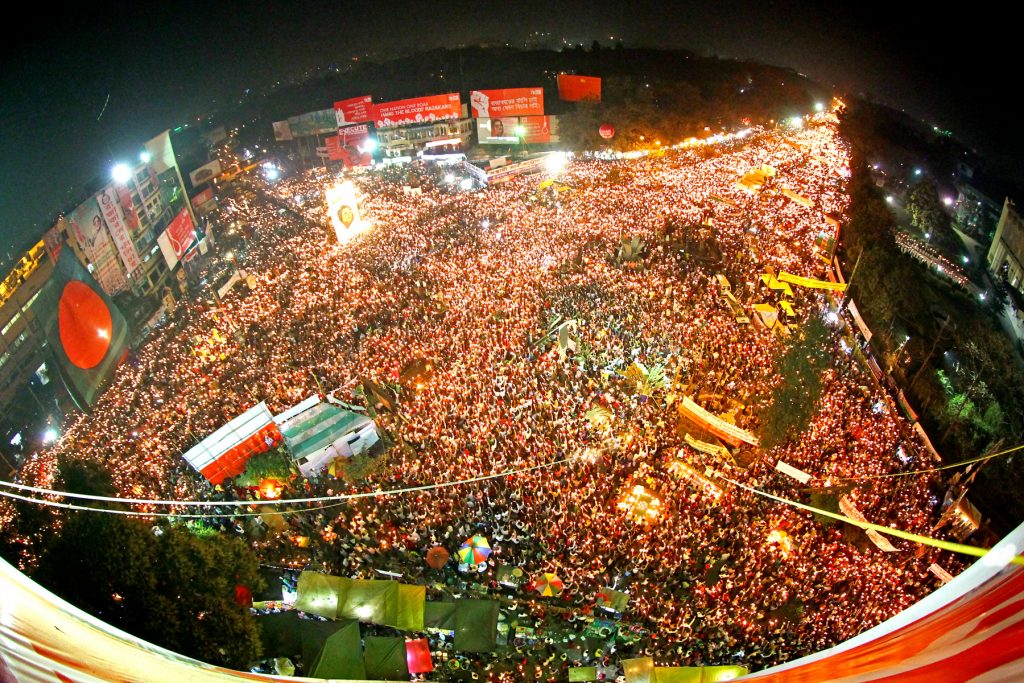
We collected signatures of scores of thousands of passers-by who were convinced of our cause of demanding capital punishment for these Rājākārs accused of heinous crimes. We submitted their signatures to the authorities. This movement was widely highlighted in the international media. At that juncture on 15 February 2013, one of us, Ahmed Rajib Haider who used to express his atheistic worldview under the pseudonym Thaba Baba, was hacked to death by the Islamists. Sword was used to silence the pen. Starting from the next day, attendance at our protest dropped significantly. We held the funereal of Rajib at Shahbag itself but the movement was losing stream after having suffered from political intrusion.
What happened then on the March 7, 2013 when you were severely wounded in an assassination attempt?
Within three weeks of Rajib’s death, I was coming back to my home after attending a programme in a public bus, two persons aged about 20 in Islamic attire started following me. Another person in similar attire came in front of me and on his gesture, these two persons from the back assaulted me with machetes. I suffered deep injuries in my head, shoulder and chest. I did not panic and ran in my bloodied state to take cover and reached a traffic police box. I am pretty sure, that run would have earned me a Gold Medal at the Olympics. (laughs)
The police promptly took me to the nearest hospital and after receiving first aid there, I was transferred to the Dhaka Medical College. I was admitted there for weeks and was healed with time although my left side was partially paralysed for many months.
Did you receive support from the society against these deadly attacks on you?
Not really. On the other hand, my attackers enjoyed support from the very top echelon of the society to all the way down. When I later registered the case of the assassination attempt on me with the police, the policeman present there was unhappy to know about my atheistic inclinations and wryly commented that I was the one who should first be arrested. Can you just imagine that!
Pressures were building upon my family—my wife and in-laws—to withdraw the case against the Islamist attackers, from all quarters including the police. My employer categorically told me that my atheistic assertion made my colleagues avoid my company. And, I was forced to resign from my job.
This continuous pressure from all quarters made my wife divorce me to avoid living a dangerous stressful life.
I became an ultimate social pariah. I was given nominal police protection but I was convinced that the threat to my life would persist as long as I remained in Bangladesh. Sympathetic police officers too told me privately that if a change in political power took place with a person with stronger connection to Muslim fundamentalists, then I might even be arrested.
We see. It was impossible for you then to go back to live your normal life after this murder attempt. How did you survive then?
I emigrated to Bahrain, a relatively secular country, in the Middle-east in November 2013 and took a job employing my skills in multimedia and creative work. I simply disappeared from the rest of the world and lived a dormant life.
But you could not remain long dormant, could you?
I was shaken altogether again on 7 August 2015 when Neeloy Nil, my good friend, was hacked to death in Bangladesh because of his atheistic beliefs. I decided again to voice myself using social media against the intolerance of Islam. My activism earned me many admirers in the social media. This time I was cautious and did not reveal my real location to anyone.
I used to be the only executive in my office when I used to post things in the social media. All others in my office were manual workers, although from Bangladesh. I did not see this coming that some of them reported to my employer regarding my atheistic outlook and activities. A conspiracy was hatched against me. One day they had tactfully secured their official secrets from me. When I reached home that evening, I was fired over a telephone call. Gradually I came to know that a case of blasphemy has been registered against my name that would translate into a prison sentence of 15 years for me. I found myself alone cornered in a foreign land with even my passport in possession of my erstwhile employer who had turned hostile.
So your employer took exception of your atheism, really harshly. Did you get a chance to explain your case to him?
I had to surrender to my employer even after he had fired me most unethically and also deprived me from my due benefits as an employee. He categorically told me to leave Bahrain same day. My repeated pleadings to him fell into deaf ears. He was adamant and he did not even care about the precarious state of my life in Bangladesh if I had been made to land in there. Immediately I was boarded by him on a flight to Dhaka.
Again at Bangladesh! You escaped to Bahrain from Bangladesh to secure your living and freedom of expression. How did you respond in such a difficult time of your life?
I managed to call my mother over phone from the airport and told her to purchase a ticket to Kathmandu, Nepal for me. I landed in Dhaka airport and did not even set foot outside the airport. She came over as visitor inside the airport and handed me the ticket. Next day from Kathmandu, I took an enormous journey to India for about 18 hours. I crossed the border to India taking help from one of my contacts—it was a quite simple affair at the end.
Why did you choose India?
Through social media, I have a long list of friends in India. I was helped by some of them to get a temporary legal stay in India.
What is the difference in cultural attitude between Bangladesh and India from an atheist’s viewpoint?
In Bangladesh, my life is at stake for my atheism, but lakhs of people, actually persons in influential positions, are atheists in West Bengal. They can express their opinion freely and fairly. People from both West Bengal and Bangladesh are Bengalis and from the very same culture. The only reason that I cannot express myself freely in Bangladesh is that it is a Muslim majority country while West Bengal is still not one. And, I know for sure that the day West Bengal becomes Muslim majority, I would lose my freedom of speech.
In fact, many Bengali intellectuals in West Bengal look for a Hindu-Muslim unity across the border, between West Bengal and Bangladesh. Your take?
Often people quote the line written by great poet Kazi Nazrul Islam:
We are two budding flowers together, the Hindu man and the Muslim man.
I retort back:
Oh Dear! Oh Dear! Then why did you break India and create Pakistan?
Riyadh to Dhaka to Bahrain to India—your long journey was more of a mental development. Of developing better and better understanding about the world around you. What is your identity now?
Biologically I was a human being when I was born like I am now. I, today, say with pride that culturally I am a sanatani—the follower of the eternal tradition, the Sanatan Dharma. Had some Muhammad Ghori or some Ikhtiyar al-Din Muhammad bin Bakhtiyar Khilji not converted my ancestor on the point of sword to Islam, I would have grown up chanting a hymn in my own language rather than uttering prayer in a foreign language.
What is your attitude towards Hinduism?
Because of my background, my knowledge of Hinduism is limited. I am always against the oppressor and with the persecuted. I found my voice in the following verse of the Gita (4: 7-8):
Yada yada hi dharmasya glanirbhavati bharata
Abhythanamadharmasya tadatmanam srijamyaham;
Paritranaya sadhunang vinashay cha dushkritam.
Dharmasangsthapanarthaya sambhabami yuge yuge.
This verse clearly says that the oppressor will be defeated and the persecuted will receive the final justice. Can any word of the world be sweeter than this couplet?
Do I believe in everything of Hinduism? Hell No! But I know something for sure: Hinduism can be changed, it can be reformed. Two hundred years ago, Sati (immolation of wife in husband’s pyre) was part of the Hindu tradition; today not a single Hindu even considers its reintroduction.
You are a victim of Islamism and like in Bangladesh, Islamism has become a recurrent problem in many Muslim societies across the world. However, most Muslims are good persons irrespective of the theology of Islam. Atheists like Sam Harris feel that the attack should be against the Islamic Theology which is at the source of the Islamism problem. On the other hand, people like Maajid Nawaz or Ayaan Hirsi Ali feel that taking a direct hit at Islam will mean a terrible bloodshed as innocent Muslims will be in a dilemma. The best thing to tackle Islamism is to reform Islam.
What do you think about it? What is the most humane solution to this problem?
Yes, it is definitely true that most people in a Muslim society are peaceful. If there are a hundred violent muslims, more than a lakh of the peaceful moderate muslims remain in the same society. The only problem is that these moderate muslims act as apologists for the violent muslims. What we require is to bring out the truth about Islam to all Muslims. Let them study Quran and understand if we need this Quranic Law for the civilised human society of today. Why the attack happened against me? A clear possibility is that I could match the Islamists to discuss the Quran with my knowledge of Arabic, which they could not digest.
At the same time, Madrassas must be closed and modern education should be imparted to all the Muslims without exception. Vigilance must ensure that funds and operational facilities remain outside the reach of the Jihadi Muslims.
Do you have any final word to offer to the readers of this article?
My final submission to the Hindus and to the atheists: If you do not read the Quran being a Hindu or being an atheist today then you will have to read it tomorrow being a Muslim.


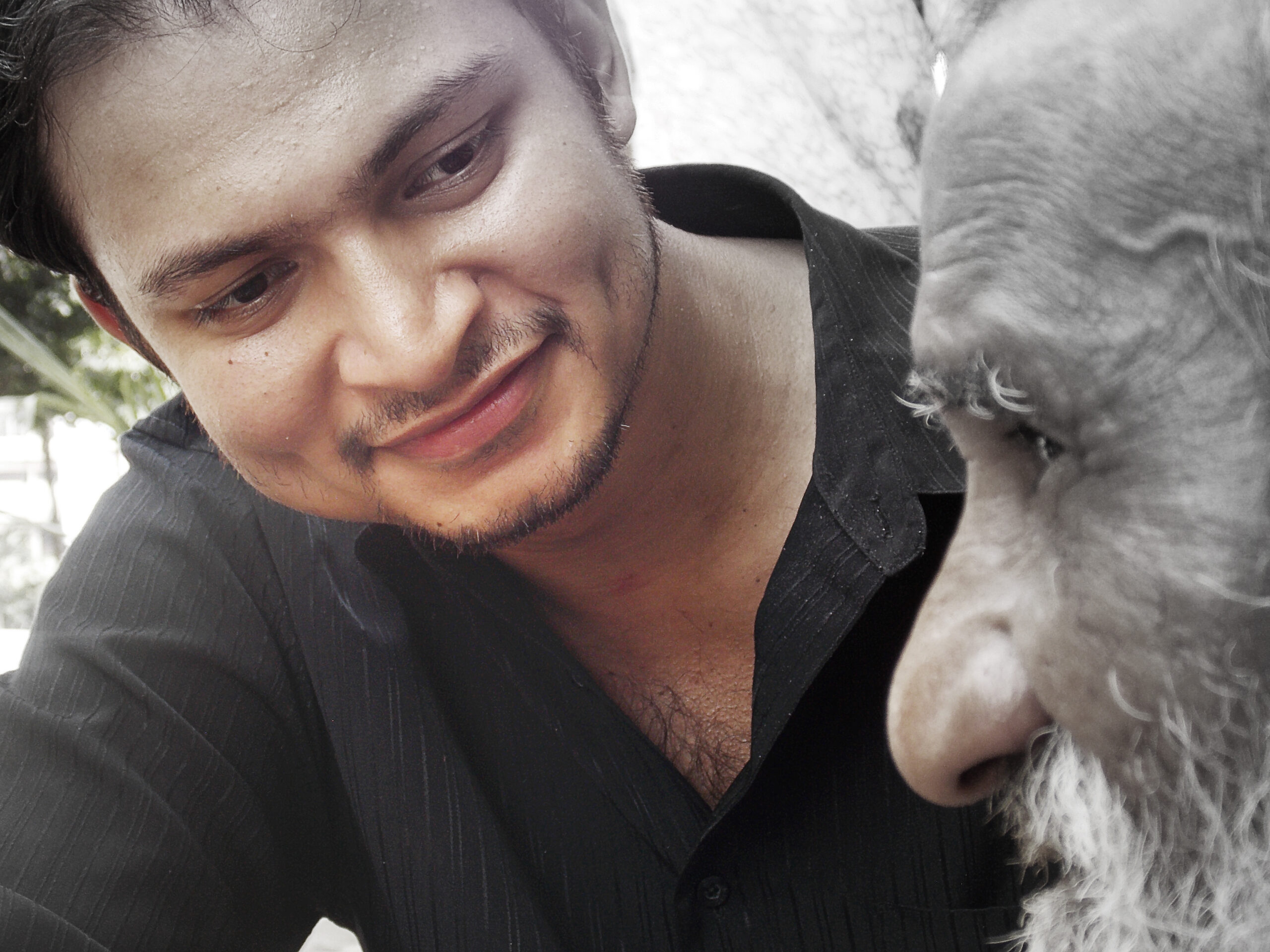
1 Comment
India is surrounded by the islamic fundamentalist. Hindus should do something to protect themselves before it is too late. If not then, Hindus will found themselves on the side of suffering once again and will may become the refugee in their own country.